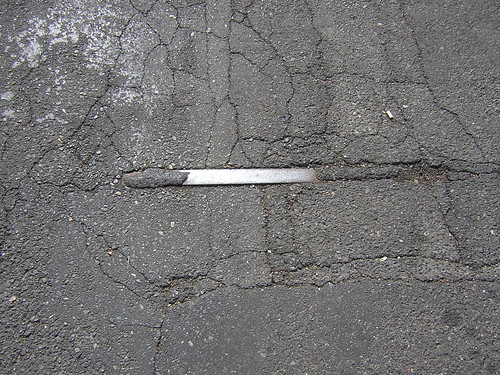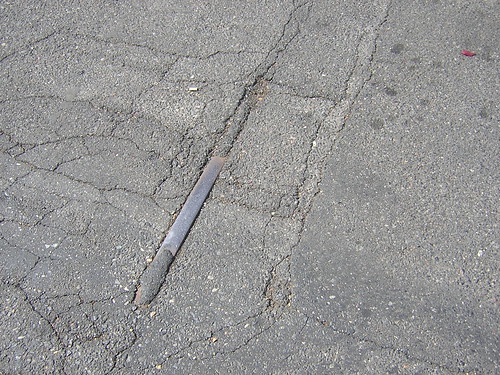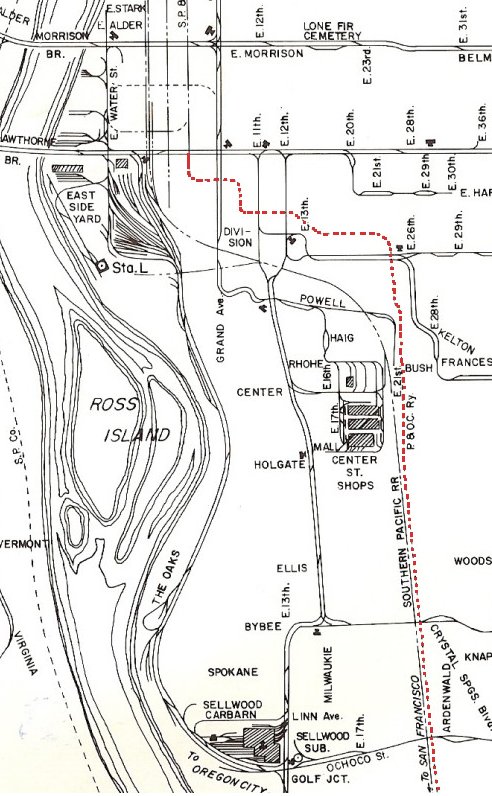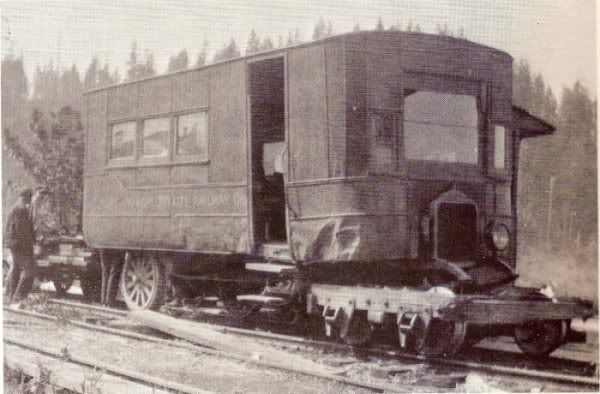
I always feel like such a moron standing in the middle of a road taking a picture of the freaking street.

I knew 11th & 12th avenues were streetcar arteries back when (Richmond & Waverly-Woodstock lines, off the top of my head) but this track is aligned east-west on Caruthers, not north-south. At 1st I thought it was just a remnant of the early evolution of the Woodstock line, which meandered all through the central eastside area between Hawthorne & Division ("Sector Line road") before aligning on the 11th/12th axis.
I got home & looked at some maps but didn't see anything on Caruthers. Then I looked at the big map in the inside cover of Labbe's book, & found this curio... (the map's legend identifies dotted lines as "foreign lines").

Turns out the Portland and Oregon Company Railway was incorporated by one Stephen Carver in 1913.1 Armed w/ $200,000 in capital, Carver dreamt of a street railway and interurban system capable of competing w/ existing monopolistic Portland trolley titan PRL&P. His vision involved exercising common-user rights to the existing tracks across the Hawthorne Bridge and tracks owned by the Clackamas Southern RR in Oregon City. Carver applied for franchises in Portland & Gladstone, while the backers of the Clackamas Southern applied for 1 in Oregon City.
The Portland franchise was granted in October & Gladstone's in November. The Oregon City franchise was granted in Jan. of 1914, but included a clause requiring transfers be made available to the PRL&P Oregon City Interurban. Carver wouldn't have it & split from the Clackamas Southern group, which was sold to PRL&P shortly afterwards anyway.
Undaunted, Carver altered his route to head south out of Portland then east along the south bank of the Clackamas River through Milwuakie up to the Viola area. Tracks originating at SE 3rd & Hawthorne wove through SE Portland, eventually running parallel to the SouthernPacific tracks out of town as far as, eventually, the new township of Carver.
Then, there was the matter of trolleys for his railway. Carver acquired some second hand steam engines but these weren't allowed in Portland city limits & were too big to navigate the streets anyways.
As a temporary fix he acquired a used White Motor Co. bus & rigged flanged wheels to the back & railroad trucks to the front.

This 'hybrid' is hardly what springs to mind when I think about a 'railway' but as it turned out, this train-bus contraption was the only service ever provided on the R&OC Line. Financing could never be secured for a rail bridge across the Clackamas at Carver & w/o the service to Viola the line perished for lack of ridership.
Carver tried to reimagine his rail system again in 1923 as a strictly-lumber railroad, but this too withered away & the tracks were eventually sold to Southern Pacific.
-d.d.
1 Labbe, John T. Fares, Please! Those Portland Trolley Years. Caxton Printers, Caldwell, Idaho (1980) p. 159-160.

